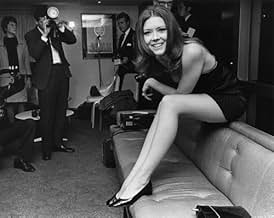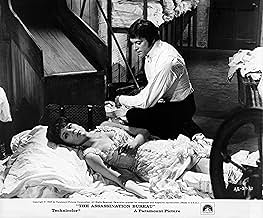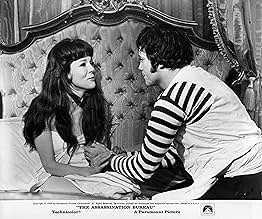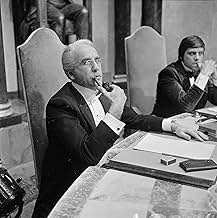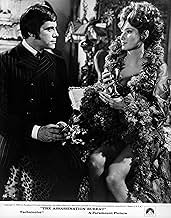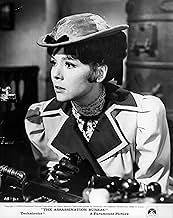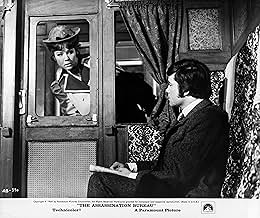Oliver Reed e Diana Rigg conducono un impeccabile cast nel film The Assassination Bureau, un "caper movie" pieno di spirito ispirato a un libro il cui co-autore è Jack London.Oliver Reed e Diana Rigg conducono un impeccabile cast nel film The Assassination Bureau, un "caper movie" pieno di spirito ispirato a un libro il cui co-autore è Jack London.Oliver Reed e Diana Rigg conducono un impeccabile cast nel film The Assassination Bureau, un "caper movie" pieno di spirito ispirato a un libro il cui co-autore è Jack London.
- Regia
- Sceneggiatura
- Star
- Premi
- 2 candidature totali
- Gen. von Pinck
- (as Curt Jurgens)
- Police Inspector
- (non citato nei titoli originali)
- French President
- (non citato nei titoli originali)
- French President
- (non citato nei titoli originali)
Recensioni in evidenza
Oliver Reed is suavely bucaneering as the main protaganist, while the other main star, Diana Rigg of Avengers fame, does a very well-judged comic performance as the feminist journalist in 1910. It's a shame she didn't appear in more films. No other actors get much of a chance to shine, as there are far too many minor characters.
The writing is OK; you get the feeling that there should be more laughs than there are. Still, it's an enjoyable enough way to spend an hour and a half.
Rating:- *** (out of *****)
Actually he's sharper than that: THE CALL OF THE WILD and WHITE FANG were his attempts to tell a story from an animals' point of view. THE SEA WOLF is his attempt to attack the prevalent socio-economic doctrine of the day (1900): Social Darwinism, as practiced by Captain Wolf Larsen. He wrote one of the first good novels about America under a dictatorship: THE IRON HEEL. He discussed his early life in MARTIN EDEN. He discussed his alcoholism in his book JOHN BARLEYCORN. He was the first American novelist of real international stature to embrace socialism! A reporter as well as writer, his experiences watching the Japanese government prevent him from carrying out his job during the Russo - Japanese War turned him into a perpetually hostile critic of Japan's goals in the Pacific (although, to be fair to the Japanese, London did show some racism here).
Keeping this in mind, one realizes that THE ASSASSINATION BUREAU, LTD. has to be tackled differently from say THE CALL OF THE WILD or the short story TO BUILD A FIRE. London is looking with jaundice eye at the political system that had ruled Europe (and most of the world) since 1815 or so. It was oppressive and uneven, and even in the United States (probably the best major power to live in in terms of opportunity and social mobility) it was still badly flawed.
Assassination had become a serious tool for trying to influence European affairs from 1881 to 1910 (when the novel was begun by London). Tsar Alexander II of Russia was blown to bits in 1881 by a Nihilist group called "The People's Will". Although it was captured and most of its members hanged, others copied it. Assassinations continued in Russia up to 1911 including Interior Grand Duke Serge in 1904,Minister Von Phleve in 1905, and Prime Minister Peter Stolypin in 1911. Elsewhere the other states suffered. Presidents Garfield and McKinley were assassinated in 1881 and 1901 (the latter by a self-proclaimed anarchist). President Sadi Carnot of France was stabbed to death in a public parade in 1894, in the middle of a series of anarchist attacks (including a bombing at the Chambre of Deputies). Empress Elisabeth of Austria-Hungary, King Umberto I of Italy, the Prime Minister of Spain, King Carlos III of Portugal, were all killed. So were Lord Frederick Cavendish and Thomas Burke by Irish nationalists in Phoenix Park in 1882. Many smaller public figures were killed as well. The topic of an "assassination bureau" was timely - especially as some of these victims fit what the bureau decided: were the targets worthy of being assassinated.
Of course not all of them were (Empress Elisabeth for example). But London's vision was not totally flawed. It was just that being a realist he knew that the "pure" idea of the bureau would be corrupted sooner or later. So his plot involves the head of this international bureau being offered a huge reward if he orders his own assassination. Note that Oliver Reed's character is a Russian, as though the author knew who was most likely to be the head of an assassination group.
Probably due to other commitments London never finished the novel. Robert L. Fish, a successful mystery novelist, wrote a completion which was rather amusing. I tend to believe that was an error - London was seldom an amusing writer. The film treats the moral issue as a joke, and uses the characters as caricatures of the nations they represent (the doleful Russian, the gluttonous and sexually active Italian, the pragmatic Frenchmen who runs a bordello too, the English newspaper tycoon). These characters need good performers, and Philippe Noiret is on target as the bordello owner/assassin leader); and (although not Italian) Clive Revill is quite good as the Italian. The Russian (it's not Reed) is doleful, but hardly memorable. As for Lord Bostwick, Telly Savalas is not convincing as an English aristocrat (one can't even imagine him as a Canadian transplant to England, like Spencer Tracy in EDWARD, MY SON). Curt Jurgens' German assassination leader, General Von Pinck (the name suggested, perhaps, by his handiness with a sword) is either sadistically high-spirited or vicious: no other characteristics there.
Diana Rigg, as the budding journalist who's first job is actually as a cats-paw for Savalas (her boss) is pretty good, but her performance as Vincent Price's daughter in THEATRE OF BLOOD was livelier. She seems determined to maintain her suffragette style dignity here no matter what. However it happens to work for the film. As for Reed, his straight villains were usually far better than his heroes. He appears to be too laid back at times. A bit more jittery behavior would have been better.
One final point: One minor character, an Austrian nobleman marked for death, is killed when he cuts into a large knock-wurst (that has a bomb in it). This gag probably is not original but it was reused in the television movie MORE WILD WILD WEST with Jonathan Winters as the victim.
The screenplay is often full of wit and humor,with such lines as "if there's a war,people will kill each others for a penny,and we will have to shut up shop (our "assassination bureau").Actually the whole movie is a long chase through a chocolate-box Europa with a lot of traps,bombs and disguises.Diana Rigg's appearances run the whole gamut from a Victorian prude resembling Mary Poppins to a femme fatale,from a widow in deep mourning to a nun,she's astonishing.So does (and is )Oliver Reed,who plays some British Arsène Lupin.History is given a rough ride when Francis-Ferdinand is murdered in Vienna (instead of Sarajevo) but who cares?
Best scene:Diana Rigg is alone in her hotel bedroom in Venice,Italy:she can hear a ticking.No,it's not the clock.So she rushes into her bathroom where a tap(faucet) is dripping.But when it's closed,the noise still remains.Is-it a bomb? .The brothel scene where Rigg is mistaken for a hooker is also great fun!
Two movies made in the seventies might have been influenced by Basil Dearden's amusing comedy:Douglas's Hickox's "theater of blood" (1973) also starring Rigg- a treat that should not be missed-and Ted Kotcheff's "who's killing the great chefs of Europe?" (1978)-Jacqueline Bisset cooks a bombe glacée here-.The people who liked this movie could do worse than picking those delightful black comedies.
Lo sapevi?
- QuizJack London's original novel was left markedly incomplete at the time of his death, and it was not until many decades later that the thriller-writer Robert L. Fish (also known as Robert L. Pike) finished it for publication, amidst much publicity. The novel is noticeably more serious in tone than this movie, although a New York Times review at the time called it "delightfully ridiculous."
- BlooperIn the scene, about 40-45 minutes in, where Lord Bostwick visits General Van Pinck whilst the latter is at fencing practice, you will see a map of Europe on the wall. Although this film ostensibly takes place before World War I, the map is of post-Versailles Europe, c.1925-1939.
- Citazioni
Miss Winter: With your ideas, I'm surprised you're shocked at the thought of war.
Ivan Dragomiloff: Not at all. It's purely a matter of business. How can we charge our sort of prices with everybody happily killing each other for a shilling a day?
I più visti
- How long is The Assassination Bureau?Powered by Alexa
Dettagli
- Tempo di esecuzione1 ora 50 minuti
- Mix di suoni
- Proporzioni
- 1.85 : 1
Contribuisci a questa pagina


